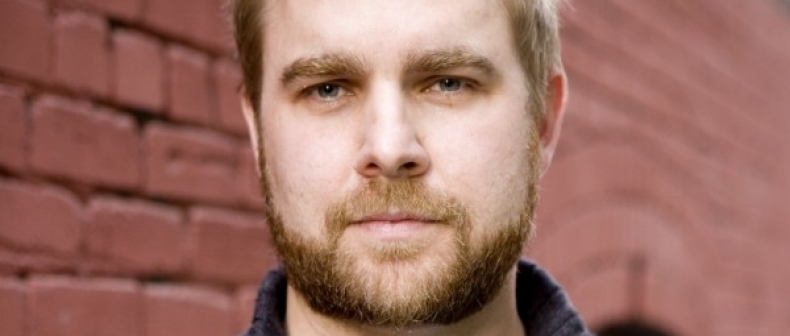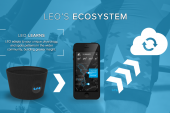
Movers and Starters is an exclusive series that profiles the individuals who drive Toronto’s startup community.
Tell us a bit about yourself and what you do currently.
I’m a partner at The Working Group. I’ve been here almost two years. In a fairly big personal move, I left the world world of enterprise software to do something more entrepreneurial.
Can you tells us about your background and what you’ve done in the past?
From an education perspective, I actually come from an arts background–I studied English and history in university. Partway through, I realized that the career options that kind of education offered me were not in line with my passions. While growing up, I was always into technology– dabbling and learning stuff on my own–so when I came out of university in 1998, I pursued a career in the tech sector. I started in a consulting role at a small, up-and-coming software company in the performance management and business intelligence space. I stayed there for a while as the company grew and expanded, and after a couple of international moves and an MBA, I moved into a product management role at Actuate, a Silicon Valley-based software firm, where I also did some business intelligence work. And from there I moved on to The Working Group.
A close facsimile of the TWG team.
How did you get involved with The Working Group (TWG)?
I’ve worked for a variety of companies at various stages of their life–from startups to mid-sized companies, and from mid-sized companies to public ones; specifically from 1999 to 2002, I helped and worked in the startup scene in San Francisco. So I’ve had a lot of exposure to companies of all sizes, but I’ve never been a founder myself. Around 2005, I started thinking about making a move on my own. I had some ideas I wanted to explore further. At the same time, I met Dominic, Andres and Jack, all of whom would become my partners at TWG.
We were meeting on a regular basis in a different context, but soon enough we were getting to know each other, and as we did, we started sharing ideas and see that we had similar visions for what we wanted to do personally and for what a company like TWG could become. So instead of going out on my own, I decided to join forces with them. Doing that has enabled me to explore some of the things I wanted to do personally, learn what it’s like to be a business owner and have a stake in the game.
For those that don’t know about TWG, can you explain what the company does?
The Working Group is an internet software company. We build custom digital products for organizations of all sorts of different shapes and sizes, including big brands and organizations like the Globe and Mail, the Toronto International Film Festival and BlackBerry. We also help high growth companies like FreshBooks and startups at different stages of their life.
Additionally, we’ve expanded our operation to include partnering more closely with some of the startups we work with, including investing in some of them. Recently, we’ve taken that a step further and actually started incubating a couple of startups. We bring them in so that we can not just work on a product together, but so that we can also help them build out their teams, processes, and provide them with mentorship on both the technical and product side of things. In contrast to some of the more traditional accelerators out there that are more focused on go to market strategies, sales automation and scaling, we’re much more process and product development focused.
For the startups within the TWG portfolio, has having a development studio helped create opportunities that might not have have existed for them had they gone with a more traditional accelerator?
I certainly hope so. Before I joined, the desire to work with and build startups was there probably more subconsciously. About the time I joined, a part of the TWG team created an off-shoot startup called PostageApp. PostageApp was born out of TWG wanting to scratch its own itch. The platform they built was meant to help send personalized transaction and event driven emails from web apps, and the product we continue to build around providing that service has become a full-fledged business.
The most innovative things happening in our space are being driven by startups and entrepreneurs with strong, innovative visions.
Moreover, that’s the kind of work that attracts the best developers and designers. When you’re competing with Facebook and Google for the best talent–and they have the offices in Toronto and Waterloo to grab that kind of talent directly out of school–you have to have something compelling to offer.
It also comes from us enjoying that kind of work, and realizing that it supports our great company culture and environment. Supporting new product and business ideas internally and working with startups that come to us also supports our vision that great software will make the world a better place.
That said, there’s obviously a high amount of risk in that kind of work–both for us and the startup in question–but that’s the kind of risk we enjoy taking on; we’re able to build assets as investors as opposed to just being a pure service-based business.
To answer the first part of your question, though: I think where the startups benefit is that we’ve been building software for a long time. We understand what it takes to build a great product and, on top of that, we’re firm believers in lean startup principles. We follow those practices and train the startups we work with on how to apply them to their own operation. Of course, we also learn from each other. They bring interesting stuff for us to learn; in return, we teach them how to build a good development team, how to build a great product, how to iterate on that product and how to get investors involved just as they’re gaining traction. We also know what we aren’t, so we focus on and teach the things we do best.
What have been some highlights and challenges throughout your time at TWG?
It’s a bit of a general highlight, but one of the highlights has been seeing TWG come into its own as a company. Since I joined, we’ve more than doubled in size, and with that growth has come the knowledge that we can do bigger and better things. We have the capability of bringing on people and helping them become even better engineers and designers than they were when they came in, or training someone how to grow their team while maintaining a cohesive company culture.
Conversely, I think the challenges are directly related to what I just mentioned. We’re at a critical stage of growth, and there are growing pains that come along with it. When a company doesn’t have that many people, there isn’t much of a need for process or layers of management. Once you get to the size that we’re at now, though, you need to start thinking about building a process, and that’s been challenging for myself, my partners, and probably the whole team. Thankfully, we’re working our way through it.
You’ve spent part of your professional life in San Francisco and London, England. How does Toronto’s startup community compare to the ones located in those two cities? What made you decide to come back to Toronto and help build TWG?
I’ll answer the last question first: I decided to come back largely because my wife and I wanted to have a family and we felt like the Toronto was going to be a great place to do that. London was an amazing city to live and work in, but also expensive and far away from our families. We knew if we started having kids that everything we loved about London would be harder to enjoy; it’s this large international city with a lot of hustle and bustle that’s a lot harder to enjoy with strollers and baby carriers. We were torn obviously, but ultimately decided to come back.
From a pure career perspective, I always imagined I would either stay or end up back in the Silicon Valley. If you’re in the technology space–and this starts to answer your other question–the community there is second-to-none. It’s really quite different from anywhere else and I still go back there often. The tech industry there, as a percentage of the total economy, is so much larger than anywhere else in terms of tech and startups. There are challenges as a result of that–for instance, most of the people working in the industry are constantly moving from company to company and, as a result, I don’t think people are as loyal to the companies they work for. At the same time, however, it’s a great place to learn, start new projects and find people to work with. It’s still by far the centre of the tech universe.
London is similar to Toronto in that it’s more of a diverse region for industry; tech and startups are just one small piece of the puzzle there. London, like Toronto, has grown and matured exponentially in the last ten years. There’s a ton of great activity and people doing interesting things. That said, it still sometimes feels disconnected from what’s happening in North America. We live in a more connected world, but there are still elements of a unique North American and European experience.
When I came back in 2004, I immediately thought, God, I’ve been gone for so long. I felt like I didn’t have any sense of community within my field, so I went looking for it. At the time, it was a really small and tight-knit community. I remember going to these grungy demo camps that were held at the Imperial Pub and meeting cool people like Mike McDerment, David Crow, and Jay Goldman. Two years later, demo camps became this big deal as they started attracting hundreds of people.
According to the Startup Genome, Toronto is ranked fourth in the world when it comes to startup activity, and based on my experience I believe it to be true. The talent in South Western Ontario is fantastic, there’s more seed capital coming into the region than ever before, and the Canadian economy has been doing relatively well in a global sense. All these factors put together have helped create a more robust tech and startup ecosystem. On top of that–and this is the critical piece–is that there has been reinvestment back into the ecosystem by entrepreneurs that have had past success. You’re starting to see people having successful exists and starting new projects–Dan Debow of Rypple (acquired by Salesforce) and Workbrain before that is a great example of this. Silicon Valley is far from the only place to build great tech companies. New York city has grown leaps and bounds in this regard, and we’ve just opened a New York office to help fill some of the product design and development shortfalls that exist in that market. There is no doubt in my mind that Toronto is firmly on the map in the tech world.
Having worked in the startup space in London, Toronto and San Francisco, have you noticed any difference in how entrepreneurs from different countries go about building their startups? Is there a difference in things such as methodologies and perceived best practices?
I don’t have enough personal experience to speak to that, though any experience I do have–and this comes from my involvement with Startup Weekend where I’ve met with event organizers from around the world–tells me that when it comes to building a startup, any geographical and cultural barriers are broken down. I feel like there’s a global sensibility on how to build a startup now, and that we’re better at sharing that information. Of course, there are small differences here and there, but there’s so much common ground we can connect on.
You helped bring Startup Weekend to Toronto. For those that don’t know, can you first tell us what the event is all about?
It’s an intensive 54-hour event for people from all sorts of backgrounds that are interested in entrepreneurship. They come together and pitch ideas to one another in an open and supportive format. Those participating in the two-day event vote on their favourite ideas and form teams around the ideas that they would like to try and make a reality. At the end of the weekend, the groups show what they’ve built in a formal way to a panel of judges–so mostly VCs and other types of investors–that are used evaluating startups.
The most important thing being that the people attending the event are coming together and learning how to formulate and validate their ideas using lean startup principles. They’re actually talking to real-life customers and users, and iterating on the idea that they present at the start and collecting data to help support their ideas and then prototyping them along the way. Amazingly, people build some pretty robust products over the course of a weekend. Seeing what people from different backgrounds learn is powerful. And as it should be in the world of startups, you see in that short amount of time that execution is everything: after all, ideas are a dime a dozen, but how you execute an idea is where it all comes together.
What was the motivation for bringing the startup weekend to Toronto? What do you think it has meant to Toronto’s community?
Well, the motivation was a complete fluke. I was attending a separate event out in the Silicon Valley and, in reading up on that event, I stumbled upon the website for Startup Weekend. I thought it was a cool idea and, having only read about it and not experienced one in person, I decided to tweet out a question to my limited following: “Why isn’t Startup Weekend happening in Toronto?” The people running the event in Seattle saw my tweet and asked me to help them bring Startup Weekend to Toronto and the rest of Canada.
It turns out that Startup Weekend had happened in Toronto in its first incarnation back in 2007, but wasn’t successful for a variety of reasons. At first, I tried to find other people to help organize the event, but I couldn’t properly engage with the people in the community that I thought would be the right ones to run the event, so one thing led to another and I found myself running the event.
Once I experienced it, though, it was so powerful that I became committed to it, which says something, because I don’t particularly like running events. Since then we’ve had four Startup Weekends in Toronto– all of which have been some of the biggest and most successful Startup Weekends globally, culminating in our last one where the winner of our event went on to win the global Startup Weekend challenge that crosses 140 cities around the world. So, it was a nice validation that the community here in Toronto has what it takes to compete internationally.
That said, I don’t think that’s what’s most powerful about it. The most powerful aspect of the event is how it engages existing entrepreneurs and people that want to dip their toes into entrepreneurship, and provides them with real experiential learning in a way that is much more powerful than attending a lecture or an online workshop. It’s so immersive and intense that you really get a true experience. I’ve seen people whose lives have been transformed during Startup Weekend. I’m biased maybe, but I think its the best tech startup event in the city.
In your role as a startup mentor, what has been the hardest piece of advice you had to give to someone?
It’s important to be honest and realistic with people. Without naming any names or ideas, the hard advice is telling someone they should stop what they’re doing. Often, the person in question either has incorrect expectations or they aren’t putting the right effort behind it. There’s also a lot of what I call “want-repreneurs,” which is great if they’re exploring it for the right reason, but most of the time it’s someone that just saw The Social Network and thinks that they have next idea that’s going to blow up like Facebook. Often those ideas need to be deeply criticized and validated. It’s hard telling people, “Sorry, I don’t think you have it right,” or “Sorry, I don’t think you have what it takes,” but you have to do it sometimes.
Out of curiosity, in giving out advice have you ever been proven wrong?
I’ve been proven wrong in terms of thinking someone doesn’t have what it takes; you can prove me wrong on that point forever. However, so far for the ideas I thought needed to be shut down–and I’ve given that advice–the people behind those ideas have not taken my advice and have yet to see their ideas take off. Of course, it doesn’t mean that those ideas won’t work in the future. After all, no one is an expert at this stuff.
Aside from your work, what are some of the things that you’re passionate about?
As a parent of two young daughters–I have a six year old and a three year old–I’ve been exposed to a world I had never experienced before. My eldest daughter has special needs, so her and the people that work with her in school and in the world of special needs are so inspiring. People with special needs have challenges that most people can’t even comprehend.
She faces challenges I’ve never had to face, and she will always have to live with those challenges. I’m inspired by her and the people that have dedicated their lives to working with people that have higher needs. It’s also given me great perspective on my work. I see that the challenges I face at work are insignificant compared to the challenges my daughter faces every day.
Going forward, what’s next for you personally and professionally?
I feel like I’m in the ‘what’s next’ phase. Having only been a couple of years, this was the next big move for me, and I still feel so excited for where we are and where we’re going.
____
Igor Bonifacic is a writer working for the Toronto Standard. You can follow him on twitter @igorbonifacic.
For more, follow us on Twitter @TorontoStandard and subscribe to our newsletter.














